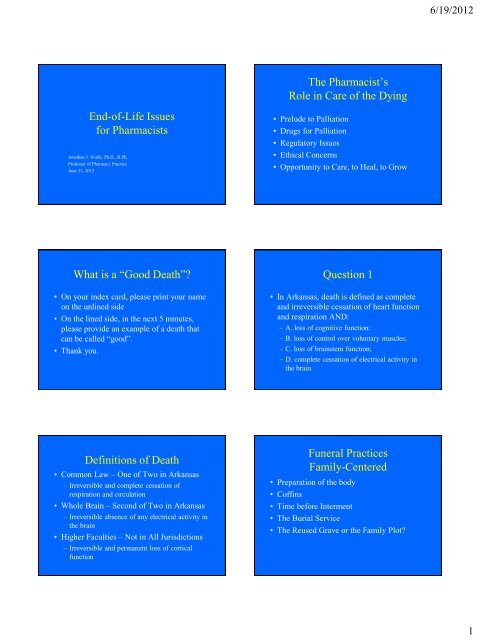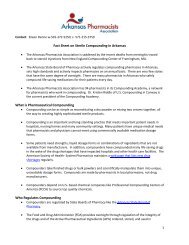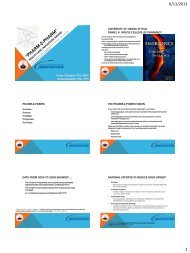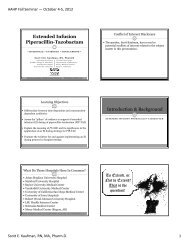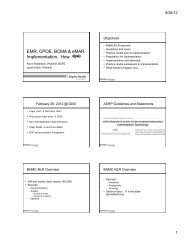Jon Wolfe, RPh, PhD, Robert Wolfe, CPA, & Scott Pace, Pharm.D., J.D.
Jon Wolfe, RPh, PhD, Robert Wolfe, CPA, & Scott Pace, Pharm.D., J.D.
Jon Wolfe, RPh, PhD, Robert Wolfe, CPA, & Scott Pace, Pharm.D., J.D.
- No tags were found...
Create successful ePaper yourself
Turn your PDF publications into a flip-book with our unique Google optimized e-Paper software.
6/19/2012The <strong>Pharm</strong>acist’sRole in Care of the DyingEnd-of-Life Issuesfor <strong>Pharm</strong>acists<strong>Jon</strong>athan J. <strong>Wolfe</strong>, Ph.D., R.Ph.Professor of <strong>Pharm</strong>acy PracticeJune 23, 2012• Prelude to Palliation• Drugs for Palliation• Regulatory Issues• Ethical Concerns• Opportunity to Care, to Heal, to GrowWhat is a “Good Death”?• On your index card, please print your nameon the unlined side• On the lined side, in the next 5 minutes,please provide an example of a death thatcan be called “good”.• Thank you.Question 1• In Arkansas, death is defined as completeand irreversible cessation of heart functionand respiration AND:– A. loss of cognitive function;– B. loss of control over voluntary muscles;– C. loss of brainstem function;– D. complete cessation of electrical activity inthe brain.Definitions of Death• Common Law – One of Two in Arkansas– Irreversible and complete cessation ofrespiration and circulation• Whole Brain – Second of Two in Arkansas– Irreversible absence of any electrical activity inthe brain• Higher Faculties – Not in All Jurisdictions– Irreversible and permanent loss of corticalfunctionFuneral PracticesFamily-Centered• Preparation of the body• Coffins• Time before Interment• The Burial Service• The Reused Grave or the Family Plot?1
6/19/2012EmbalmingTechnology Arrives• Purpose– Esthetic, Hygienic, Guarantee againstrevivification• Sudden Demand– Mass casualties of Civil War in remote places• A New Trade– Death managed outside the home, as a businessthat produces status-symbol goodsDeath Leaves the Home• From a Family to an Institutional Setting• The public hospital -- once a shameful place• The emergence of interventionist medicine• Best practice in hospitals, therefore death[“failure”] also happens there• Attempts to define a “normal” dying andgrief processQuestion 2• The greatest recent change in funeralpractices in Arkansas has been the increasednumber of:– A. interments in above-ground crypts;– B. burial in mausolea;– C. burial without a coffin;– D. cremation.Your Own Plan• Estate Planning is a Foundation Course• It Must Include Your Family• Formulate and State– What is Important to You– What Disposition You Want for thePossessions You Have Built Up– How Your Designated Managers Shall KeepFaith with Your WishesDocuments• Your Will – Do Not Let Technical FlawsThwart Your Wishes• Your Health-Care Directives– A Living Will is NOT Enough!• Other Planning Tools Appropriate to You– Annuities, Gifts During Life– Insurance, TrustsWhy A living will ANDA Medical Power of Attorney?• A living will: written document whichallows a person to make a presentdeclaration about future medical treatment.• A living will typically focuses on theapplication of life-sustaining treatments.• A Living Will is Not Enough– Future Interpretation– Difficult Circumstances2
6/19/2012Prelude to Palliation• Diagnosis of Certain Fatal Illness• Conference to Determine Patient’s Will• Conference with Family/Intimates• Proper Order:– No Not Resuscitate– Comfort Care Only– Allow Natural DeathClasses of Drugs• Analgesics – Relief of Pain– Opioid– NSAID• Tranquilizers – Relief of Anxiety– Antianxiety– Antidepressant• Sedatives/Hypnotics – Level ofConsciousnessOther Useful Drugs• Antiinflammatory Steroids• Antitussive – Cough Suppressant• Antiemetic – Anti-Nausea/Vomiting• Nontraditional Analgesics – Pain Relief• Terminal Sedation/Palliative SedationDrugs – Demand Careful Definition andUse• Everything Else in the FormularySpecific Drugs 1-- Opioids• Morphine – The Gold Standard• Oxycodone – Synthetic• Hydromorphone – Semi-Synthetic• Fentanyl – Short-Acting, Available asTransdermal Patch, Infusion• Methadone – <strong>Pharm</strong>aceutical Long-ActingLimits to Drug Selection• Renal Status/Insufficiency• Bleeding Diathesis• Hypovolemia• Fragile GI Mucosa• Concurrent DiseasesAdded Limit?Regulatory Concern• Use of Opioids is Proper• Barriers may Include– Inappropriate Concern about Addiction– Concern about Manipulation– Consequences of Regulatory Scrutiny– Liability Claims4
6/19/2012NSAID Dosing Guidelines• Build Rapidly to Maximum Dose• ASA is the First Line• APAP is the Second Choice• Other NSAIDs per Patient Tolerance• Consider Limiting Factors: CHF, RenalStatus, GI Irritation, Hepatic Toxicity“Weak” OpioidsThe Second Step• Convenience for Prescribers• Codeine as the Model– Useful up to 200 mg orally– Biotransformation to morphine• Fixed Combinations with NSAID– Inhibit Titration of Opioid Dose– Limit Opioid Daily Dose– New 3000 mg Daily Limit for APAPMixed Agonist/Antagonists• Synthetic Opioids– Analgesic Ceiling– Escalant Respiratory Depression– Unacceptable Side Effects– Withdrawal Symptoms in Opioid-DependentPatient– Few Oral Formulations (Pentazocine only incombination -- with Naloxone, ASA, or APAP)Pain is Dynamic• Appropriate Drugs May change– Increases with Course of Disease– May Remit– May Masquerade• Anorexia• Nausea/Vomiting• DepressionRegulatory Concerns/Obstacles• Legally, relief of pain is part of the “usualand customary” practice of medicine.• Therefore, dispensing is protected if– Physician/Patient/<strong>Pharm</strong>acist Relationship isintact– Prescriptions are within usual and customaryscope of practice• Consistent and Sufficient Documentation ISMandatoryQuestion 6• The use of a pain-relieving drug that mayalso depress respiration illustrates thePrinciple of:– A. Stare Decisis;– B. Double Effect;– C. Primary Intention;– D. Double Indemnity5
6/19/2012Question 7• The pharmacist can do the most benefit forthe dying patient in the treatment of:– A. depression;– B. pain;– C. infections;– D. xerophthalmia.Specific Drugsfor Palliative and Terminal Sedation• Morphine IV• Lorazepam IV• Propofol IV• Appropriate ONLY as a Response to– Severe and Unrelieved Pain– In a Patient Actively Dying– Intended only to provide palliation– Continued until patient expires – natural deathMay Accompany Terminal Sedation• Comfort Care Only• Discontinuation of Tube Feedings• Discontinuation of Intravenous Therapy• Continuation of Intravenous Access• Discontinuation of Futile Therapies• Institution of New TreatmentsNOT Terminal Sedation• Dose in excess of reasonable palliative dose• Dose intended to produce death• Dose that replaces previous comfort care ofthe dying patient• Dose that accompanies abandonment of thedying patientWhat Does Not Change?• The dying and death of our patients will occur, despite bestcare.• Some conflict in dying may properly be managed byplanning.• We may expect to grieve, for their deaths foreshadow ourown.• <strong>Pharm</strong>acists can provide relief of suffering for all thedying.• Care for Ourselves as Provide This CareManner of Death• The Law recognizes 5 Manners of Death– Natural: self-defining– Accidental: due to unintended actions of self orof other– Suicide: due to deliberate action by decedent• Once styled “Felo de se”– Homicide: due to deliberate action by another– Undetermined: self-defining6
6/19/2012Social Prompts: Manner of Death• Is Any Essentially “Good?”• What does one say … or do, if– Natural?– Accidental?– Suicide?– Homicide?– Undetermined?Which is More Difficult?• Expectations of– Others– Ourselves– Our Peers• Each is a Portal into GrievingGrief• Natural Response to Loss• A Single Certainty – Change in theSurvivor’s Life• Can include Many Emotions– Sadness/Depression– Anger– Regret– Fear (The Future, The Unknown)Unhealthy Responses to Grief• Attack– Misplaced Defense of Self– Displaces Discomfort onto Others• Avoidance– Attempts to Deny the Reality of Loss• Self-Harm– Wounds the Self, Rather than AcknowledgingPain of LossCoping – Healthy Responses• A Social Process• Acknowledges Grief (Pain, Sadness,Loneliness, Other?)• Allows Time for Grief Work• Seeks Support in a Realistic Manner• Keeps Sight of Mundane ResponsibilitiesResults• Unhealthy Responses lead to– Lack of Healing (short-term and long-term)– Unresolved Feelings of Loss• Healthy Responses lead to– Appropriate Mourning– Healing, as Far as Possible– The Faded Scar may be the Best Proof7
6/19/2012Stages of Grief• Kübler-Ross’ 5 Stages– denial, anger, bargaining, depression, andacceptance• Another, with 7 Stages– Shock & Denial; Pain & Guilt; Anger &Bargaining; Depression, Reflection, &Loneliness; Upward Turn; Reconstruction &Working Through; Acceptance & HopeAnother Grief Model• <strong>Robert</strong>a Temes– Numbness (mechanical functioning and socialinsulation)– Disorganization (intensely painful feelings ofloss)– Reorganization (re-entry into a more 'normal'social life.)Wants of Patients• The Dead are beyond our reach. We can nolonger physically or psychically help, norharm, them.• The Survivors, who must grievesuccessfully, or lead diminished livesremain as our patientsWants of Caregivers• Security for ourselves• Acknowledgement of our loss• Acknowledgement of our ties to the dead• Time/Space to grieve• Time/Space to heal ourselvesResults of UnsuccessfulGrief for the Caregiver• Dissatisfaction with Practice• Anger• Withdrawal into robotic conduct• Avoidance of future attachments to thedying• BurnoutRole of Time• Does it heal?– In a narrow sense– If no other way, by loss of clear memory• It does bring Change– Hurtful Change, if it limits future living– Desirable Change, if it adapts, enriching futureliving8
6/19/2012Feelings When Grieving• Time Standing Still (“Outside” of Events)• Family/Friends allow too little time to bepresent, to share, our grief• Frustration from Lack of Energy,Concentration• Obsession with the PastOther Feelings When Grieving• Awareness of Risk/Hazard– “I have never done this without _____.”• Holiday Insecurities– “This was her/his/our favorite holiday. How doI celebrate it now?• Aloneness– Different than Solitude. Prompts: Awakening,Bedtime, Mealtimes, Homecoming, MorningCaring for CaregiversIn Grief and Through Grief• First – What do you now do to cope withconflict, anger, loss of energy, negativefeelings in general?• Make Your Own list.– Prayer, Exercise, Companionship, Change ofScenery, Service, Meditation, other PositiveActivities• This is where you begin.In Your Family• Speak candidly about feeling sad, aboutwhat you have lost• Speak gently, focusing on “I feel”statements• It is OK to say things more than once• Be open to the caring you will encounter• Nothing is too hard for your loved ones tohear, but you do soften the detailsProfessional Support• Talk to your own physician• Do not hesitate to ask for and to acceptpsychiatric help• Do not dismiss the use of short-term Rx• Seek a grief support group• You are not the first, nor aloneAnodynes to Avoid in Grief• Alcohol or other depressants• Use of drugs, outside of supervised therapy• Passivity– Sleep/TV, “relaxing”, isolation, overeating,skipping eating, “comfort food”• Imprudent Major changes in your life– Major purchases, shopping as an end, expensivetravel, new commitments too soon9
6/19/2012In Your Practice• Find a confidant or confidants• Face the cause of your grief• Accept (or even welcome) support• Seek development (depth or breadth) ofworkLearn• The essence of our profession• A central part of all our selves• A necessity to avoid stagnation• A source of new insight• A source of delightWork• The <strong>Pharm</strong>acist’s work is service.– Antidote to idleness– Source of continuity– Source of resources for the new– Source of perspective for your own lossPlay• Look at the word “Recreation”– “Re” (again) + “Create”– To make a New Person• A chance to explore the untried• A chance to revisit the enjoyed• A venue to renew acquaintance and meetnew personsRelease• Let go of what was lost• Hold tight to the memories, for they arenever lost• Let go of hurtful memories• Let go of negative talk• Let go of negative self-talkHope• Do not expect to find The Lost, for you willnever recover that in this life• Expect scarring. You will not heal and findyourself unchanged• Assert your own worth, for the loss did notlessen that• Expect to find a future better than grief canimagine10
6/19/2012Love• We need to use the word more• Consider why you chose your profession,was it not largely because you wanted a lifethat serves The Other?• Would you not continue some part of thisservice, so long as you live?• Love for yourself means conserving yourpowers to remain part of creation.Religious/Spiritual• Your faith life continues even in grief– conferring meaning on grief– providing the presence of clergy– establishing formal rituals for mourning– supporting survivors like yourself– placing you in community– providing you a place of safetyWhy is Healthy GrievingImportant for the Caregiver?• You are too precious to lose to absent orfailed grieving• You are too scarce a resource to lose• You are of too much worth to lose• Your talent and diligent work merit a goodoutcome when loss finds youDeath and DyingEstate Planning and Estate Taxation<strong>Robert</strong> J. <strong>Wolfe</strong>, MA, <strong>CPA</strong>2012What is estate planning?• “The preparation of a plan ofadministration and disposition of one'sestate using a will, trusts, gifts, power ofattorney, etc…” from State Farm.com• Estate planning is a process with multiplesteps and multiple considerations whichaddress both the decedent and thesurvivors.The Estate – things to consider• The Estate consists of all equity which hasbeen accrued and earned over the courseof an individual’s life.• Estate Planning offers the chance to makedecisions which will affect that equityafter death.11
6/19/2012Estate Planning Step OneEstate Planning Step Two• Maintain an up to date listing of yourassets and liabilities.• Do not avoid questions about property,medical treatments and death.• Your career and your life are a businessand you are the owner. Maintain theresults of your career and life with thesame care and consideration with whichyou maintain the activities of your career.• Consider your desires and wishes as wellas the desires and wishes of those closeto you.Estate Planning Step ThreeEstate Planning Step Four• Determine what your decisions are.• Discuss your decisions with your spouseand others affected by those decisions.• For your own protection and theprotection of your beneficiaries, makeyour decisions known.• Be prepared to reconcile your decisions, ifthere are any conflicts with your spouseor others affected.Estate Planning Step FiveFundamental Estate Planning Tools• Structure your estate plan with yourestate planning team.• Revisit your plan regularly.• Be prepared to pay for your estate plan.• Your Will• Your Powers of Attorney (POA’s)• Your Living Will• Your Health Care Proxy12
6/19/2012What is your will?• Your will is a document which designatesthe people to manage your estate anddesignates the transfer of the assets ofyour estate.• Your will is governed by state law and it ishighly advisable to consult an attorney inits construction.Arkansas restrictions on wills• “If a Will is typewritten, it must be signed by at leasttwo witnesses to the testator's signature. Thewitnesses should be persons who do not receive anyproperty in the Will.”• “A handwritten (holographic) Will is valid in Arkansasif it is entirely in the handwriting of the testator andsigned by the testator. It may be witnessed, but doesnot have to be. To be admitted into Court after thetestator's death, three persons familiar with thetestator who will not receive any property under theWill must testify that the handwriting and signatureare the testator's. The danger of a homemade Will isthat you may inadvertently create an instrumentwhich is not valid or which has unintendedconsequences.”The Arkansas Senior Citizens’ Handbook -Arkansas Bar AssociationMaintaining Your WillWhy is a will of signal importance?• Your will is a living document and should beevaluated regularly for any changes to thelaw governing the will and the law governingtaxation of the will.• Your will is a living document and should beevaluated when any significant changes occurin your life. Examples include marriage,divorce, the birth of a child, and the majorityof a child.• Dying without a will results in the deathbeing considered intestate.• Intestacy leaves your estate and yoursurvivors to the processes of the courtswhich can result in unnecessary delaysand costs.Personal Representatives• One or more personal representatives arenominated by the will to take charge of theestate.• You may resign as a personal representativewith the court’s approval• Functioning as a personal representativecarries several duties and commensurateliabilities for failure to perform those duties.• Banks with trust powers and TrustCompanies are able to serve as personalrepresentatives.The Duties of a Personal Representative• Take possession of and protect the real and personal property, excepting thehomestead and real estate specifically given by the will.• Keep real estate and personal property properly insured.• Receive the rents and payments due and collect interest, dividends and otherincome.• Make proper demand for and collect all the debts, claims and notes due.• Assist in determining the names, ages, residences and degree of relationship ofall possible heirs.• Litigate or settle any pending lawsuits in which the deceased had an interest.• Keep the property of the estate in good repair.• Keep surplus funds invested.• Obey and perform all the orders of the court.• Determine and pay federal and state estate taxes and federal and state incometaxes.• Pay the valid claims of creditors and, if necessary, sell the estate property to doso.• Distribute the remaining assets to the proper heirs.13
6/19/2012What is a power of attorney?General and Specific Powers of Attorney• “A power of attorney is an instrumentwhich authorizes another person totransact business or make certaindecisions on your behalf.”• A general power of attorney has broadapplication to allow the attorney totransact business for the principal.• A specific power of attorney limits theability to transact business to specifictransactions.The Arkansas Senior Citizens’ Handbook -Arkansas Bar AssociationWhat makes a power of attorney Durable?Why are powers of attorney important?• Most POA’s are revoked upon death orincapacity of the principal.• A Durable POA is not affected bysubsequent disability or incapacity.• A Durable POA can be drafted to go intoeffect when the principal becomesincompetent.• Powers of attorney are important becausethey allow you to choose who will makedecisions in your place rather than forcingthe courts to choose the decision maker.• Powers of attorney function best when usedto discuss your decisions with individualsyou trust to follow through on them.What is a living will?What is a health care proxy?• A living will is a written document whichallows a person to make a presentdecision about future medical care ortreatment.• A living will typically focuses on theapplication of life-sustaining treatments.• A health care proxy is a durable medicalpower of attorney.• A health care proxy gives the authority tomake health care decisions to another ifyou are unable to make those decisionsyourself.14
6/19/2012Make your wishes known.Silence is the source of conflict.• In order for a living will to function, itmust be known that you have a living willand the living will must be available.• In order for a health care proxy tofunction, it must be known and availableand your proxy must know your decisionsand be trusted to follow them.The team approach to estate planning.• Your Attorney• Your <strong>CPA</strong>• Life insurance professionals• Appraiser• Financial and Investment Planners• Personal representatives• TrusteesWhat will your attorney do?What will your <strong>CPA</strong> do?• Draft your will and other legaldocuments.• Review those documents with youregularly for any changes in your decisionsor any changes in law.• Assist with record keeping of assets andliabilities• Plan your estate to reduce tax burdens• Prepare estate tax and final income taxreturns for filingWhat is Probate?Why is probate disliked?• Probate is a legal process for transferringyour assets to your survivors.• A probate court proceeding is requiredregardless of whether or not a will exists.• Probate costs money and can cost asmuch as 5% to 10% of the gross estate.• Probate takes time. State law requires aminimum of six months probate time toallow time to make claims against theestate.• Probate creates public records which canresult in an uncomfortable lack of privacy.15
6/19/2012Remember Real EstateHow can probate be addressed?• Real estate is governed by the probaterules of the state it is in. If real estate isowned outside of Arkansas, a separateprobate will occur in each state wherereal estate is owned.• An effective will streamlines probate.• A contested will or an intestate deathexacerbates costs in time and money ofprobate.• Probate is intended to address assets heldin your name.Additional Ways to Hold AssetsWhy a joint tenancy?• Joint tenancies• Living trusts• “Pour-Over” Provisions• Property in joint ownership does not passthrough probate.• Property in joint ownership is controlledequally throughout the joint ownership.• Property in joint ownership is still subjectto taxation.Why a living trust?Why a “pour-over” provision?• You structure the trust.• The terms of the trust do not becomepublic during probate.• The assets held by the trust do notbecome public during probate.• Holding all assets in trust is not practicalduring an individual’s life.• The “pour-over” provision shifts theassets into trust in the event of death andallows the assets to be managedordinarily during life.16
6/19/2012What do I do when someone dies?What do I do next?• Immediately contact your bank regarding any jointaccounts which are required for regular expenses.• Locate important papers such as bank statementsand bank books, deeds and insurance policies.• Locate important certificates such as birthcertificate, marriage certificate, military dischargepapers, social security card, tax forms, birthcertificates for any minor children.• Obtain multiple copies of the certified deathcertificate.• Avoid making life changing decisions or largepurchases, unless previously planned, untiltime has passed and you are able to addressdecisions rationally.• Do not be pressured by others because youare a survivor, personal representative ortrustee. Perform your duties and follow thewishes of the decedent.Estate TaxationKey Estate Tax Items• The estate tax is a tax on the transfer ofassets from one individual to another.• Estate taxes are identical to “inter-vivos”gift taxes.• Your Annual Exemption• Your Unified Credit• Your Marital Exemption• Income with Respect to DecedentTaxation• Life Insurance Proceeds• Transfers within three years of deathYour Annual Exemption• For 2012 your annual gift tax exemption is$13,000.• Any individual can gift $13,000 to any otherindividual without reporting the transfer or payingtaxes on the transfer.• In estate planning, remember that this applies toeach individual. Two parents may thus gift$13,000 each to a child moving $26,000 out ofthe estate.529 College Savings Plans• A qualified 529 college savings plan is an instrumentstructured by a state to encourage college savings.• 5 years of annual exclusion may be used at once to fund a529 plan to a maximum of $65,000.• Therefore one individual may contribute $65,000 in one yearto a 529 plan with no tax consequences other thanconsuming the majority of 5 years of annual exemption.• To utilize the 5 year provision, a gift tax return must be filed.17
6/19/2012Your Unified CreditMaximum Estate and Gift Tax Rates• Your exemption from estate taxes results from aunified credit against calculated taxes owed.• 2012 - $5,120,000 Exemption from a $1,772,800credit• 2013 and after – $1,000,000 from a $345,800 credit ifno changes are made to current law• The Unified credit has been in constant flux since2001. This area requires regular discussion with yourtax professional.• 2012 – 35%• 2013 and after – 55%• These rates have been in flux since 2001.These are another consideration todiscuss regularly with your taxprofessional.“Inter-Vivos” Gift TaxationThe Bottom Line for your patients.• “Inter-vivos” gifts are simply transfers of assets from you toanother during your life.• During 2012 “inter-vivos” gifts are covered by the same$5,120,000 exemption from a $ 1,772,800 credit.• After 2012, “inter-vivos” gifts are covered by a $1,000,000exemption from a $345,800 unified credit. The effect of thischange on gifts prior to 2012 over this limit is uncertain.• This is the same credit which covers estate taxation.Remember that “inter-vivos” gifts affect your estate taxsituation.• If a net estate, after expenses, charitablecontributions and settling the debts of thatestate is less that $5,120,000 this year orless than $1,000,000 after 2012 then noestate taxes will be owed.• Speaking broadly, from 2008 information, 1 in73 estates generated an estate tax returnand 1 in 166 owed estate taxes.taxpolicycenter.orgYour Marital ExemptionI just gave you $1,772,800.• 100% of assets transferred to your spouseare exempt from estate taxation.• Do not ignore your Unified Credit in theface of the Marital Exemption.• During 2012 the unused portion of yourUnified Credit is portable to a survivingspouse. This is another item that has anunknown future after 2012.• When one spouse dies, that spouse should alwaystransfer assets up to the full amount of theirUnified Credit to someone who is not theirspouse.• The portability of the credit during 2012 may notsurvive. I recommend not relying on it.• Unfortunately, after 2012, I’ve only given you$345,800.18
6/19/2012Income With Respect to Decedent Taxation(IRD Tax)Life Insurance Proceeds• An income tax return will have to be filedfor you for the year in which you die.• Certain assets, if handled improperly, canimmediately fall into your annual income taxreturn in the year you die.• This primarily affects Standard IRA and401(k) retirement savings.• Life insurance proceeds paid to abeneficiary upon your death are not taxedas part of your estate, unless you or yourestate are the beneficiary.• Life insurance proceeds are a key tool inplanning to manage estate taxes.Transfers within three years ofdeath• Also known as transfers in anticipation ofdeath.• Broadly speaking, if you retain control overan asset in any way, it will be part of yourestate.• This issue is a trap for the unwary. Properlyplanned trusts and gifts are unlikely to everexperience this issue.Trusts and You – Key Trust Items• Living Trusts• Irrevocable and Revocable Trusts• ILIT’s• Charitable Remainder and CharitableLead TrustsCredit for Tax on Prior TransfersLiving Trust• As part of the Tax Relief UnemploymentInsurance Reauthorization and Job Creation Actof 2010 a credit was created for tax on priortransfers.• In brief, if an asset has been transferred during thelast 10 years and tax has been paid on thetransfer of that asset, a credit is available if theasset is transferred again.• A living trust is any trust created duringyour lifetime.• A living trust is an instrument which holdsassets and is controlled by a trustee.• This transfer may or may not continue after 2012.19
6/19/2012Irrevocable and Revocable TrustsILIT’s• An irrevocable trust cannot have its termsmodified in any way after the trust iscreated.• A revocable trust may have its termschange.• In order for a trust to be used as a vesselfor a transfer of assets out of your estate,it must be irrevocable.• An ILIT is an Irrevocable Life InsuranceTrust.• An ILIT holds a life insurance policy andreceives the proceeds of that policy uponyour death for the benefit of some otherindividual or individuals.• The premiums paid on the life insurancepolicy on behalf of the ILIT are an “intervivos”gift to the beneficiary or beneficiariesof the trust.Charitable Remainder andCharitable Lead Trusts• A charitable remainder trust pays an incomestream to a beneficiary and the residual ofthe trust passes to the charity at some pointin the future.• A charitable lead trust pays an incomestream to the charity and the residual of thetrust passes to a beneficiary at some point inthe future.• A charitable trust must be irrevocable.• A charitable trust is a charitable deduction inthe year it is formed and funded.Calculation Example One• A married couple with a $8,000,000 networth. How best to use theirexemptions?Calculation Example TwoCalculation Example Three• A Wealthy individual with a single piece ofnon-liquid property worth $9,000,000.How best to address the taxes?• A $3,500,000 traditional IRA is the largestasset in an $8,000,000 estate. What arethe tax effects? How can those taxeffects be addressed?20
6/19/2012Other General Items• Use Roth IRA and Roth 401(k) options toshelter the compounding on yourretirement savings.• Student loans are typically dischargedupon death.<strong>Robert</strong> J. <strong>Wolfe</strong>, MA, <strong>CPA</strong>• Audit Manager• Frost, PLLC• Email: rwolfe@frostpllc.com• Additional Email: robertjwolfe@gmail.com• Office Phone: 501-537-7439• Office Fax: 501-374-5520• Cell Phone: 501-690-3114GRAPHIC WARNING• The lecture talks about death…it may beuncomfortable, but it’s going to happen to all of us, soyou should plan for it the best you can.WILLS, ESTATES, & OTHERMEDICAL LEGAL DOCUMENTSS C O T T P AC E , P H AR M . D . , J . D .• Lots of new terminology…I will try to explain each term,but if I don’t raise your hand and I’ll define.• Most of the discussion today revolves around whathappens to your stuff once you die.• Lots of legal information is in this presentation, but thispresentation is not intended to provide legal advice.FIRST FEW DEFINITIONSLET’S ASSUME BOB HAD A WILLWHO GETS BOB’S ESTATE?• Since Bob died with a will, the will controls so long as_______________.Bob writes his last will andtestament.Bob is a testator.Bob’sStuff• How to determine if the will is valid?• Was it created properly?• Was it revoked?• Is there a newer will?• Was a revoked will revived?If Bob dies without a will,he dies intestate.Upon Bob’s death, Bob’s stuff is called his estate.21
6/19/2012FORMALITIES OF A WILLINTENTIONALITIES OF THE WILL• Basic rules:• Testator must be of sound mind• Must be at least 18 years of age when will is created• Must be witnessed by at least two competent witnesses(interested vs. disinterested)• Must be signed by the testator and at minimum 2 witnesses• Testator must declare his intent for this to be his final will andsign the will in the presence of the witnesses• Testator’s signature must be at the end of the will or codicil• Witnesses must sign in the presence of testator (self provingaffidavit)• All participants must be participating on their own free willwithout coercion• Exception is a holographic will• If formalities are met, then the intentions of thetestator will be followed where they are made withreasonable certainty in the will• Documents in existence at the time of executionmay be incorporated• Incorporated writing may be altered by testatorafter its preparationHOW TO REVOKE A WILLBOB’S WILL• By the creation of a subsequent will which revokes theprior will or part of the will either expressly or byinconsistency• By being burned, torn, cancelled, or destroyed with theintent and for the purpose of revoking it by the testatoror at the testator’s direction• If only a partial revocation, remainder of the will remainsvalid• Can revive a revoked will by re-executionI, Bob Smith, acknowledge that this is my last will and testament.I leave my house to my only son, Joe Smith.I leave $25,000 to my oldest daughter, Jane Smith.I leave $1 to my youngest daughter, Sue Smith.I place the residue of my estate in trust for the benefit of the First United Methodist Church ofConway for the exclusive purpose of purchasing and installing a pipe organ manufactured byGreat Organs of Austria within 24 months of my death. The remaining trust assets shall be used forthe benefit of the Conway Boy’s & Girl’s Club.My wishes should be carried out by my favorite cousin, O. James Simpson.Signed & witnessed in the presence of each other this 28 th day of September, 2011.Bob SmithWitnesses:Jane SmithAlan GoldsteinTheresa WilliamsBOB’S STUFF• A joint savings account with Betty Johnson, Bob’s secretlover - $150,000• A 401(k) worth $575,000• Life insurance valued at $250,000• A 2011Lexus LS460• A personal checking account with $85,000• A lease on a penthouse apartment in downtown LittleRock with 9 months remaining at $1500 a month• Personal belongings in the apartment worth $100,000,including his grandmother’s wedding ring• 300 acres of land at the intersection of Chenal and Hwy10 in West Little Rock• Non-probate transfers (NPT)• Omitted heirs• Simultaneous death• After acquired property• Pretermitted heirs/afterborn heirs• Pretermitted spouse• Ademption• Type of title of property• Elective shares• Kids• Support trusts, charitable trustsOTHER WILL FACTORSFOR BRIEF DISCUSSION22
6/19/2012HOW IS THE WILL ADMINISTERED• Either the will may name or the court may name anExecutor to handle the estate• If the Executor refuses to serve or can’t serve, thecourt may appoint a substitute• Executor has a fiduciary duty to the estate(reasonably prudent person standard)• The is called the Probate processIF THE WILL IS INVALID OR IF THERE ISNO WILL…THEN WHAT?• Bob is presumed to have died without any will andhas therefore passed away intestate (without a will)• State’s law of intestacy controls to determine whogets the stuff• Court appoints an executor to administer the estateand then follows statutory scheme of state• So who get’s the stuff???TABLE OF CONSANGUINITYINTESTACY CONTINUED• Con – “together” Sanguine – “blood”• Arkansas limits intestate inheritance to 5 degrees• Limits to 5 th degree to avoid “laughing heirs”• If there are no living relatives within 5 degrees, thenthe estate escheats to the stateBENEFITS OF HAVING A WILLWILL VS. LIVING WILL• Reduces conflict amongst surviving heirs• Minimizes court involvement in disposition of estate• Reduces overall cost to dispose of estate• In larger estates, they are valuable tools to minimizethe estate’s tax burden• What is a “larger estate” has been in flux since PresidentGeorge W. Bush took office and continues to be today…soit is wise to plan• Will – becomes an enforceable legal documentupon death• Living Will, also known as an “advanced directive” –allows you to preplan medical care that you wantto receive in the event that you can no competentto make decisions in real time• Like a Will, a Living Will must meet certain formalitiesto be valid23
6/19/2012COMMON CONDITIONSADDRESSED IN LIVING WILLSCOMPARE DURABLE POWER OFATTORNEY FOR HEALTH CARE• CPR• Artificial ventilation• Surgery• Dialysis• Administration of certain drugs• Blood• Hydration• Nutrition• Other specific requests• Formerly included in the traditional Power ofAttorney (POA)• Separate Durable Health Care Power of Attorneycreated by Legislature within the last decade• It is a contract where you are designating a trustedperson to be your “agent” to make medicaldecision on your behalf• Formalities must be followed, including capacity• It is “durable” because it survives a disability orincapacity• RevocableSAMPLE DURABLE POWER OFATTORNEY FOR HEALTH CAREPursuant to the Arkansas Durable Power of Attorney for Health Care Act (Ark. Code Ann. § 20- 13-104) (the “Act”), I hereby designate and appoint _____________________________ as my agent, orattorney in fact, to make decisions regarding my health care during periods when my healthcare provider has determined that I lack capacity to decide for myself.Specifically, and not to limit any other rights prescribed under the Act, my attorney-in-fact shallhave the power to have access to my medical records for treatment or payment decisions; todisclose medical records to others for purposes of treatment, payment, or health careoperations; to employ and discharge physicians; to consent to or refuse to consent to medicalprocedures, including the withholding or withdrawal of life-sustaining treatment, and nutritionand hydration, according to my wishes expressed in my Living Will, or, if my wishes are unclearunder the then existing circumstances of my medical condition, then upon consideration of mybest interests as determined by my physician in consultation with my agent; to admit me tohospitals, including psychiatric hospitals, nursing homes, or hospice care; and to sign allappropriate forms, consents and releases in connection with any of said matters.*Blue text is a HIPAA Designee DirectiveFull samples from Arkansas Bar Association’s Health Law SectionPOWER OF ATTORNEY• It is a contract where you are designating a trustedperson to be your “agent” to make all decisions exceptmedical decision on your behalf• May be general or specific• Old Arkansas POA’s use to also include health caredecisions…but they are no longer valid for health caredecision• Formalities must be followed• They automatically terminate in the event of incapacityor disability• Now “durable” by default in Arkansas, i.e. survivedisability or incapacity• RevocableQUESTIONS<strong>Scott</strong> <strong>Pace</strong>, <strong>Pharm</strong>.D., J.D.scott@arrx.orgscott@thepacefirm.com501-690-873524


